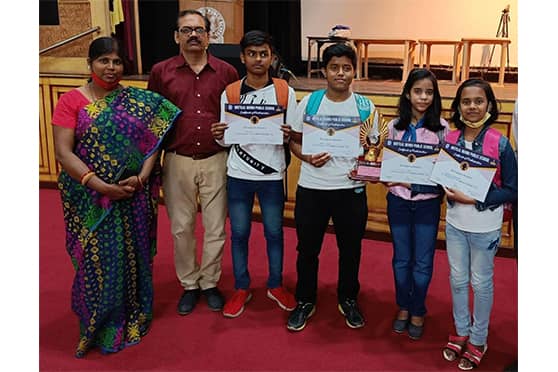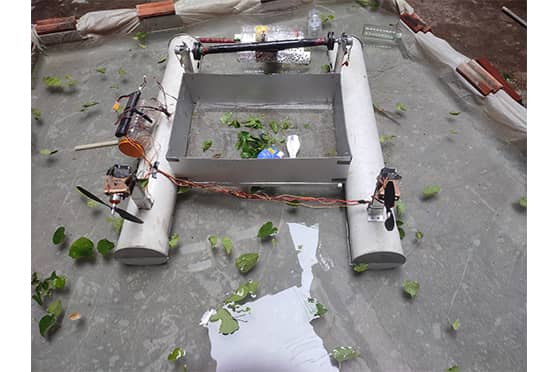School students showcase innovative models on sustainable development goals


Atal Tinkering Lab at the ICSE-affiliated Motilal Nehru Public School (MNPS) Jamshedpur hosted an inter-school design thinking and ideation competition ‘Innovate for Change on March 11.
“The competition aimed at encouraging students to understand 17 sustainable development goals (SDGs) of United Nations — designed to be a blueprint to achieve a better and more sustainable future for all and set up in 2015 by the UN General Assembly with an intention to achieve the goal by 2030,” said Ashu Tiwary, the principal of the school.
Students from 33 Jamshedpur-based schools showcased their innovative skills to solve global and local problems, focused on sustainability, without hampering our environment. The competition focused on three SDG Goals - clean water and sanitisation; affordable and clean energy; and climate change and its impact.
The host school team named Earthlings made a model on river cleaning and was adjudged the joint winner. The project collected floating pollutants on water bodies through a conveyor belt and sent them to the collecting bins. It has a large collecting bin and can carry a load of 1.5 to 2 kg. The project uses two brushless DC motors with propellers allowing them to move freely on water surfaces. Instead of the traditional way of pushing water backwards with underwater propellers to move the boat forward, the project pushed the air backwards through the propellers, the reason being that underwater propellers might get stuck and damaged due to water pollutants such as plastic bags. The boat/machine was controlled wirelessly through the Internet of Things (IoT) platform, which meant that they were able to control the movements of the boat remotely through a mobile phone from a distance.
Team Energy Hunter, also from MNPS, shared the winning title. Their thermal energy harvesting project used a thermoelectric generator as part of affordable and clean energy SDG.
“The competition aimed at encouraging students to understand 17 sustainable development goals (SDGs) of United Nations — designed to be a blueprint to achieve a better and more sustainable future for all and set up in 2015 by the UN General Assembly with an intention to achieve the goal by 2030,” said Ashu Tiwary, the principal of the school.
Students from 33 Jamshedpur-based schools showcased their innovative skills to solve global and local problems, focused on sustainability, without hampering our environment. The competition focused on three SDG Goals - clean water and sanitisation; affordable and clean energy; and climate change and its impact.
The host school team named Earthlings made a model on river cleaning and was adjudged the joint winner. The project collected floating pollutants on water bodies through a conveyor belt and sent them to the collecting bins. It has a large collecting bin and can carry a load of 1.5 to 2 kg. The project uses two brushless DC motors with propellers allowing them to move freely on water surfaces. Instead of the traditional way of pushing water backwards with underwater propellers to move the boat forward, the project pushed the air backwards through the propellers, the reason being that underwater propellers might get stuck and damaged due to water pollutants such as plastic bags. The boat/machine was controlled wirelessly through the Internet of Things (IoT) platform, which meant that they were able to control the movements of the boat remotely through a mobile phone from a distance.
Team Energy Hunter, also from MNPS, shared the winning title. Their thermal energy harvesting project used a thermoelectric generator as part of affordable and clean energy SDG.

Energy harvesting aims to utilise heat energy from a heat source that is otherwise wasted in the environment. The project worked on the Seebeck effect (a phenomenon in which a temperature difference between two dissimilar electrical conductors or semiconductors produces a voltage difference between the two substances). This effect describes the conversion of temperature gradient into electrical power using a thermoelectric generator. Any furnace/boiler/heat exchange system wastes heat as radiation. The model presented targets to utilise industrial waste heat into electrical power.
Trustee and advisor Uttar Pradesh Sangh, RP Tyagi was the chief guest and handed over the prizes to the winners.
Principal scientist at CSIR NML Jamshedpur, Arpita Ghosh, a scientist at CSIR NML Roshan Kumar and engineer in Tata Steel Subhendu Chakraborty were the judges of the competition.
Tarapore School and Gulmohur School finished second and third.